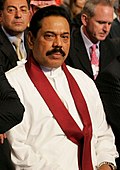Background
Presidential term controversy
Then-Incumbent President Chandrika Kumaratunga was constitutionally barred from running for a third term in office. [2]
The 3rd Amendment to the Constitution of Sri Lanka stated that if a President was re-elected for a second term via an Early Presidential election, his second term starts on the next date corresponding to the beginning of his first term. [3] Therefore, Chandrika Kumaratunga's second term would have started on 12 November 2000, as the last election was held on 21 December 1999. Despite this, Kumaratunga was inaugurated for a second term on 22 December 1999, just hours after the election results were declared. [4] With that, A Controversary on when should the next Presidential election should take place raised.
According to the Constitution, If her Second term started on 12 November 2000, her term would be ended on 12 November 2006, therefore the Presidential election should take place between 12 September and 12 October 2006. Since Kumaratunga was inaugurated for a second term on 22 December 1999, the public argued that the next Presidential election should take place between 22 October and 22 November 2005. [5] Since Kumaratunga had called the 1999 election one year ahead of schedule; she argued that the extra year should be appended to her second term. She even stated that she had a secret Swearing-in ceremony on 12 November 2000 to officially start her second term in office. [6]
Chandrika Kumaratunga sought the opinion of the Supreme Court regarding the correct date for the 2005 presidential election, following a dispute over the length of her term. The Supreme Court of Sri Lanka rejected her claims on 30 August 2005, and stated that the election should take place between 22 October and 22 November 2005, recognizing that her second term started on 22 December 1999. [7] [8]
Nominations
Nominations were accepted from 9.00am to 11.00am IST, on 7 September 2005, and the Date of the election scheduled for 17 November, was announced by the Gazette Extraordinary No.1411/1, on 19 September 2005. [9]
Sri Lanka Freedom Party
A rift opened up within the SLFP over the choice of its candidate between the candidate backed by President Chandrika Bandaranaike Kumaratunga, Anura Bandaranaike, and Prime Minister Mahinda Rajapaksa. [10]
Many members of the SLFP were uneasy with Kumaratunga's liberal economic policies, including the privatisation of several public institutions, as well as allegations of corruption against her. [11]
Despite internal disagreements, Rajapaksa was ultimately selected as the presidential candidate of the SLFP-led UPFA.
United National Party
The UNP chose Ranil Wickremesinghe as their candidate, while Karu Jayasuriya was named as the nominee for the premiership in the event of a UNP victory. Serving as an unofficial running mate. [12]
Campaign
Both candidates tried to round up the support of minor parties. Rajapaksa needed to re-assemble the alliance with the Janatha Vimukthi Peramuna that existed at the parliamentary level (the United People's Freedom Alliance). After he agreed to reject federalism and renegotiate the ceasefire with the Liberation Tigers of Tamil Eelam, the JVP and the Jathika Hela Urumaya endorsed him.
After that, Wickremesinghe's only hope of victory was through the support of the island's ethnic minorities, given his generally more conciliatory stance on the ethnic issue. He secured the endorsement of the main Muslim party, the Sri Lanka Muslim Congress, and the Ceylon Workers' Congress representing the estate Tamils. He could not, however, obtain the backing of the main Sri Lankan Tamil party, the Tamil National Alliance. Any hopes for Wickremesinghe's victory were effectively dashed when the LTTE ordered Tamil voters, most of whom would likely have voted for him, to boycott the polls.
Economic issues also worked to Rajapaksa's favor. Sri Lanka had enjoyed strong growth under Wickremesinghe's free-market policies when he was Prime Minister from 2001 to 2004, but he had also pursued controversial privatizations which Rajapaksa promised to halt. Rajapaksa also promised a policy of economic nationalism.
Debate
In the lead-up to the 2005 presidential election, the campaign team of Mahinda Rajapaksa, the UPFA candidate, received invitations from both state and private television networks to participate in a live debate with the main opposition candidate, Ranil Wickremesinghe of the UNP. Networks including Rupavahini, ITN, Swarnawahini, and MTV extended invitations to both candidates. [13]
Wickremesinghe agreed to participate and chose Sirasa (managed by MTV) as the platform. Rajapaksa delayed, citing the need to either select a single channel or participate across all channels based on committee recommendations. Wickremesinghe suggested a single simultaneous broadcast across all networks.
The debate was intended to focus on key issues such as the economy, the peace process with the LTTE, nationalism, and federalism, with Wickremesinghe positioning himself as a peacemaker and Rajapaksa emphasizing nationalist themes.
Disagreements arose over the choice of moderator: the UNP preferred Ranjith Abeysuriya, while the UPFA proposed former Presidential Secretary K. H. J. Wijedasa. Rajapaksa also insisted that only the state-owned Rupavahini host the debate, whereas the UNP advocated including private networks.
Due to unresolved disputes over the format, moderation, and network participation, coupled with concerns regarding Rajapaksa's debating experience and confidence, the debate was ultimately cancelled.
The cancellation meant that the highly anticipated face-to-face encounter between Mahinda Rajapaksa and Ranil Wickremesinghe did not take place. [13]
This page is based on this
Wikipedia article Text is available under the
CC BY-SA 4.0 license; additional terms may apply.
Images, videos and audio are available under their respective licenses.






